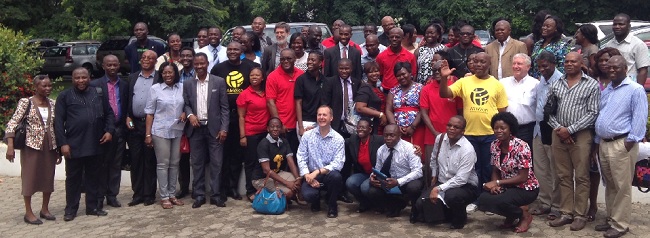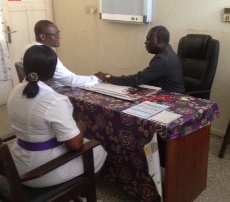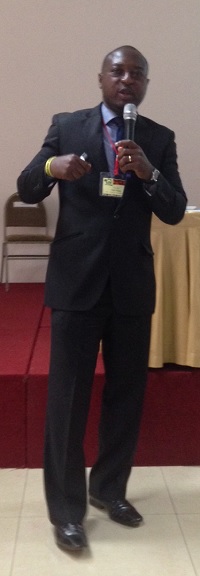From the President: Family Medicine in Africa
 Photo: Participants at the historic first Afriwon preconference, held in Accra in Ghana on May 6, 2015
Photo: Participants at the historic first Afriwon preconference, held in Accra in Ghana on May 6, 2015
español
Akwaaba! (Welcome in the Akan language of Ghana).
Dr David Nortey is a family doctor based in Accra, the capital city of Ghana in West Africa. David heads the Primary Health Care Clinic at the Korle Bu Teaching Hospital. David’s clinic provides first contact care to people from across the country, and serves as the entry point to specialist services in main teaching hospital. The clinic is also a major training centre for medical students of The University of Ghana and family medicine residents. The clinic provides comprehensive care, including antenatal services, childhood immunization programs, chronic

disease prevention and management, and short-term hospitalization. It has a cholera isolation ward, a sickle cell treatment centre, and is based next door to the city’s major HIV testing and treatment facility. It is also well prepared should Ebola ever reach Ghana.
Photo: Dr David Nortey consults in his clinic at the Primary Health Care Clinic at the Korle Bu Teaching Hospital in Accra
Ghana has a population of approximately 25 million. The country has a universal health care system, called the National Health Insurance Scheme, with all Ghanian citizens having a right to access to primary health care.
I was in Ghana attending WONCA’s 4th Africa Regional Conference. The conference was chaired by Dr Henry Lawson from Ghana, president-elect of our WONCA Africa Region.
Originally the conference had been postponed because of the Ebola crisis. Despite the shadow of Ebola still hanging over West Africa, and the challenges of travel restrictions, over 200 delegates from nearly 30 countries from across Africa and around the world attended. The program included preconference meetings of the amazing Primafamed Network, and our WONCA Africa Women in Family Medicine Working Party, led by Dr Kate Anteyi from Nigeria.
We also had the historic first preconference of our WONCA Africa Young Doctor Movement, called Afriwon, established by young doctors of Africa in 2013. Afriwon is an incredibly energetic movement, using social media to make connections across national borders, and supported by great family doctor mentors in East, West and Southern Africa. Financial support provided through the Montegut Scholarship program of the American Board of Family Medicine assisted a number of our young family doctors from across Africa to attend this meeting.
I am not an expert on family medicine in Africa, but I did work for a short time in Africa as a family doctor, back in 2008, assisting in the establishment of new HIV testing and treatment facilities in rural villages in the Limpopo Region of South Africa. I valued my exposure back then to the challenges of delivering health care to the people of Africa and I was keen to learn more at our regional conference.
In countries all around the world, the message is getting through about the importance of primary care and family medicine in ensuring universal access to health care and equitable health outcomes. Nowhere is this as important as in Africa. Compared to the rest of the world, health care in Africa is characterized by a huge discrepancy between the high burden of disease and the scarcity of health care workers, particularly doctors. Low-income countries in Sub-Saharan Africa face enormous challenges including high rates of infant and maternal mortality, HIV/AIDS, TB-infection, endemic malaria, non- communicable diseases, violence, trauma and pervasive poverty.

Photo: Delegates from Sudan, South Africa, Botswana, Uganda and Mali describing
facilitators and barriers to effective primary care in countries in
Africa
The conference heard about the extraordinary work of the Primafamed Network, the "Primary care/family medicine education network", which, over the past 20 years, has established an institutional network between both emerging and established departments and units of family medicine in universities across Sub-Saharan Africa. Building on existing strengths across Africa, the network originally linked up the 8 academic departments at universities in South Africa, with departments of family medicine in Tanzania, Kenya, Uganda, Democratic Republic of Congo, Rwanda, Sudan, Nigeria and Ghana. Since that time linkages have also been made with family medicine in other countries including Swaziland, Malawi, Lesotho, Mozambique, Gambia, Zimbabwe, Togo, Namibia, Botswana, and more. While this has been the work of many, it has been conducted under the inspiring leadership of Professor Jan De Maeseneer from Ghent University in Belgium, and African family medicine owes a huge amount to Jan for his foresight and infectious enthusiasm.
The Besrour Global Family Medicine initiative of the College of Family Physicians of Canada, led by Dr Katherine Rouleau, has also been linking up family medicine academics from Canada with colleagues in French-speaking nations of Africa, including Mali and Tunisia, but also Ethiopia and Tanzania. The Besrour Initiative has been funded by a Canadian family doctor, originally from Africa, from Tunisia, Dr Sadok Besrour, one of the major philanthropists in global primary health care.
The conference heard about the establishment of the first family medicine training program at Addis Ababa University in Ethiopia in 2013. This program has been developed with support from family medicine educators from the University of Toronto in Canada and the University of Wisconsin in the United States of America. The potential contribution of family medicine to the Ethiopian health care system is immense. The country is growing at a rapid rate and its population is approaching 90,000,000. Many people still have difficulty accessing anything more than basic care provided by health extension workers with one year of training. In recent years Ethiopia has opened thirteen new medical schools using an innovative community-based curriculum, and will soon be graduating 3000 new doctors each year. The community-based curriculum should be an ideal foundation for attracting new graduates to family medicine. Family medicine development in Ethiopia is providing a wonderful example of how much we can achieve by working together.
West Africa has faced huge challenges over the past year, especially from the impact of the Ebola crisis, and the conference tackled how we can work together to support rebuilding the health care services in the countries of this region that have been affected by the Ebola crisis, especially Liberia, Sierra Leone and Guinea, and reinforce the focus on strengthening community based health care services in all nations in Africa.
On behalf of WONCA I offered our condolences to those families that have lost loved ones to the Ebola outbreak, including the families of the brave doctors, nurses and other health workers who were infected while providing treatment, care and support to their patients.
Many front line doctors and nurses were among the victims of Ebola and this has left the health services in affected countries vulnerable and unable to cope with meeting the continuing health care needs of their communities. In August last year the WHO reported that the Ebola outbreak in West Africa had taken an unprecedented toll on health care workers, infecting more than 240 and killing more than 120. Sadly, even more of our colleagues have died since that report, with recent figures reporting 820 health care workers infected and 490 deaths.
Many of our family medicine colleagues from across Africa and across the world have been involved in the response, through global organisations like the WHO, Médecins Sans Frontières (Doctors Without Borders) and the International Red Cross/Red Crescent, and through international response teams from nations like Cuba and China. Community education has been essential, as has been the training and support of front line health workers. The challenges witnessed in the initial response to the outbreak reinforced the essential need for strong primary

care systems in every nation with well trained and suitably equipped primary care teams, and the ongoing need for strong and coordinated national and international support. The conference heard from one of our young family medicine colleagues from Ghana, Dr Gerald Kwadwo Osei-Poku, who led a medical team to Liberia to provide care to people affected by the Ebola outbreak.
Photo: Remarkable young family doctor, Dr Gerard from Ghana, describing his
experiences as the leader of a medical response team that travelled to
Liberia to tackle the Ebola crisis
I was also able to share the story of another remarkable family doctor involved in tackling the Ebola crisis: Dr Atai Omoruto from Uganda.
In July last year, Atai travelled to Liberia as the head of a medical unit of 12 health workers brought from Uganda by the World Health Organisation to fight the Ebola outbreak. Uganda has experienced a number of outbreaks of Ebola in the past and, through her experience in her own country, Atai has become one of the world’s most experienced doctors in managing cases of Ebola. In an interview with Liberia’s Daily Observer newspaper, Atai said that on arrival in Liberia, “
what I saw was dead bodies everywhere; there were more dead bodies than patients, and nobody seemed to know what to do.”
Atai and her team got to work, setting up systems to treat those affected by Ebola and supporting the training of local health care workers. The WHO had reported that in many cases, “
medical staff had been at risk because no protective equipment was available – not even gloves and face masks, and that the compassionate instincts of those who sometimes rush to aid "visibly ill" people without pausing to protect themselves also put health workers at increased risk. Health care workers were overworked, stretched thin and exhausted”, which risked mistakes happening in infection control. And doctors reported that working in protective suits was very challenging in the heat, especially in the absence of air conditioning. Indeed many facilities had no power or lighting at all.
Through their work, Atai and her team made a major contribution towards changing the course of this terrible epidemic. And it was not without its toll. At least two Ugandans died while assisting the people of Liberia. Atai stayed in Liberia for six months, working under very arduous conditions, and not returning home to her family in Kampala until December. Atai has since been named as one of the 11 most important contributors to tackling the Ebola crisis in Liberia.
Part of the tragedy of Ebola has been that health services were paralysed and unable to provide care for the other health care needs of the affected communities. We will probably never be able to quantify the preventable deaths from other conditions that occurred as a result of the loss of health care services. How many children died of malaria and pneumonia and gastroenteritis in countries where the health care systems had collapsed? How many women died as a result of loss of maternal health services? How many children will die in the future from preventable diseases due to the collapse of immunization programs?
On the last day of the conference, May 9, Liberia was declared Ebola-free by the World Health Organization, which was a cause for celebration across West Africa. Liberia and the world owe a huge debt of gratitude to Atai and Gerard and the many other family doctors and other health workers from across Africa and around the world who came to West Africa to provide support during this dark hour. We now need to advance our work to support our colleagues in Sierra Leone, Liberia and Guinea where the health care systems have been so devastated during the Ebola crisis.
Archbishop Emeritus Desmond Tutu wrote a message of hope in his preface to Hugo and Allen’s book, “
Doctors for tomorrow: Family medicine in South Africa”. He wrote, "
Doctors in family medicine are aware of the challenges, attempt to understand them better and work to address them… The issues of principles and values, relationships and meaning are not left to chance, but become an important element of service, systems, training and research. This gives me hope of a transformation in the health service that can take care of our people, which can guide us through this difficult time. This hope is not only for South Africa, but also for our brothers and sisters in the rest of the continent and the rest of the world. If the family medicine movement can play that role, let us join hands and realise that dream"
After witnessing the work of our colleagues in Africa, I share Desmond Tutu’s hope for the future.
Michael Kidd,
President, World Organization of Family Doctors (WONCA)